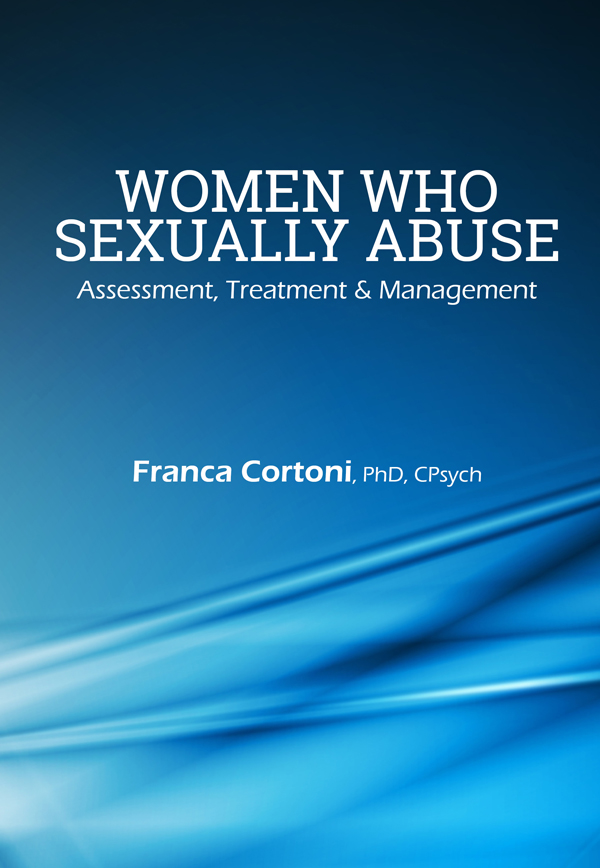Home / Shop / For Adult Clients / Professional Books for Working with Adult Clients
Gendered Treatment Assessment - A Protocol for Women Who Have Sexually Offended

- Description
- Specifications
Gendered Treatment Assessment
A Protocol for Women Who Have Sexually Offended
By Dawn Pflugradt, Bradley Allen, Megan Greene, Maricela Gamboa & Sarah Hoerl
Click here to view the Table of Contents and Introduction
Gendered Treatment Assessment is a valuable resource for mental health professionals conducting treatment needs assessments for women who have committed sexually motivated offenses. The protocol described here emphasizes the importance of a strengths-based and collaborative clinical interview and encourages the use of open-ended questions to gather relevant information in a supportive environment.
Numerous examples of the types of questions to ask clients are provided. These questions will help clinicians develop their own interview questions to fit their personal style.
This resource helps clinicians assess their clients in domains such as:
- intimacy and relationship issues
- cognitive processes
- emotional processes
- sexual dynamics
- social functioning
- personal history
A four-step assessment process is described in detail:
- Reviewing Records: This step provides a general overview of the woman's offense characteristics and helps in understanding her offense pathway. Three such pathways are described.
- Conducting Psychological Testing and a Clinical Interview: This step involves assessing each item in the domains listed above to determine which areas apply and/or would benefit from strengthening.
- Considering Responsivity Factors: The assessment process takes into account responsivity factors based on the Risk-Need-Responsivity (RNR) principles. This involves matching individuals to interventions and services based on their unique characteristics, such as intellectual/learning abilities, physical/sensory functioning, and mental health needs.
- Summarizing Information and Completing Assessment Form: The final step involves summarizing the information in a report and completing the treatment needs assessment form included at the end of the book. This enables clinicians to organize the information into a structured format and to consider modifying the form to address specific referral questions or meet the needs of their specific organizational or clinical settings.
Why A Gender-Based Assessment?
As the authors explain:
“Gendered assessment is a person-centered treatment assessment model that considers how gender affects women’s patterns of criminal offending. Although both men and women experience same or similar social and physical environments, it is the social construct “gender” that often explains the differing manifestations of criminal behaviors.”
A Strengths-Based Approach
The strengths-based assessment methodology focuses on promoting positive self-esteem, identifying existing skills, and determining additional skills that can be developed to improve client’s lives.
An extensive list of references is provided. Gendered Treatment Assessment offers mental health professionals a comprehensive and practical guide for conducting gendered treatment needs assessments, drawing from both research and clinical experience to provide a valuable resource for understanding and addressing the complex needs of women who have committed sexually motivated offenses.
About the Authors
Dawn Pflugradt is a licensed psychologist specializing in forensic and clinical psychology. She has advanced degrees in psychology, social work and bioethics. She maintains a private psychology practice and is a professor at the Wisconsin School of Professional Psychology. Dr. Pflugradt also serves on the scientific advisory board for the International Association for the Treatment of Sexual Offenders (IATSO) and is a SAARNA certified STATIC-99R and STABLE-2007 trainer. In addition to her years of clinical experience, Dr. Pflugradt has published numerous articles and book chapters in the areas of pediatrics and criminology, specializing in women who commit violent crimes.
Brad Allen is a licensed psychologist with advanced degrees in psychology, sociology, law and epidemiology. Brad maintains a private psychology practice and is also a lecturer at the Wisconsin School of Professional Psychology. In addition to 33 years of clinical experience, Dr. Allen has an eclectic research background publishing in the areas of developmental disabilities, gerontology and individuals who perpetrate sexual offenses.
Megan Greene is a licensed psychologist with advanced degrees in forensic and clinical psychology. She is currently the Psychologist Supervisor at a Midwestern medium/maximum security institution for women. She also currently oversees the facility’s treatment program for women who have perpetrated sexually motivated offenses.
Maricela Gamboa received her doctorate in Clinical Psychology from the University of LaVerne in 2013. She was first licensed in California in 2015 and also holds licensure in Utah and Wisconsin. Her experience in the treatment and evaluation of individuals who have sexually offended has included community treatment for offenders on parole, patients committed under Sexually Violent Predator statutes, and treatment of incarcerated males and females.
Sarah Hoerl graduated in 2016 with a doctoral degree in clinical psychology. She is a licensed psychologist and has been providing assessment services to both males and females convicted of perpetrating sexually motivated offenses since 2017.
ISBN: 978-1-940234-42-7
Spiral binding
52 pages
Order# WP238
Price: $50.00



